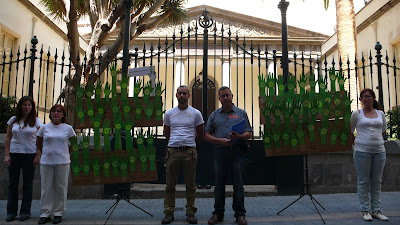Ben Magec-Ecologistas en Acción make known the groups and organizations that so far have rejected the Catalogue of Protected Species proposed by Coalición Canaria, and with which this political party will succeed in removing all the legal obstacles preventing the construction of works such as the industrial harbour of Granadilla, which not only are illegal but can also cause great environmental damage.
This Catalogue will remove the protection from many of the species that make up the rich biodiversity of the Canary Islands, in which so far 4.000 species are endemic to this archipelago. Several hundred of these species are currently threatened.
Many or the organizations that reject the Catalogue are institutions of great prestige in the scientific world. Among their members are the greatest experts in the terrestrial and marine biodiversity both at regional and at national and international level. Others are Canarian administrations that discredit the political legitimacy of the Parliament’s deputies.
Ben Magec publicizes the list of public and scientific institutions, administrations, trade unions and social groups that are opposed to the new Catalogue of Protected Species.
Many of them have made public and clear their rejection of this proposal sending letters to Paulino Rivero, the President of the Canarian Government; this was the case of the International Union for the Conservation of Nature (UICN), which on a letter sent on September the 22 stressed that “this bill of law will make the Canary Islands even more vulnerable as it degrades its Natural Heritage and Biodiversity”. Other institutions have made formal statements; this is the case of the Group for Ecology and Evolution in Islands, which belongs to the Consejo Superior de Investigaciones Científicas (CSIC)(i.e. Centre for Superior Scientific Research) and which has made the following pronouncement: “the catalogue proposes a plain devaluation in the protection of many species, as well as new a category (of interest for the Canarian ecosystems) that show severe preservation incongruities”.
It should also be stressed that so far 13 Councils and 4 Cabildos (local administrations for the island as a whole) have approved pronouncements of rejection of the bill of law, which calls even more into question the legitimacy of the deputies of the Canarian Parliament to act as representatives of the public opinion, on this particular case, as they are about to vote the greatest onslaught on biodiversity and democracy in the democratic history of the last thirty years.
The formal statements of the groups that have put their signature to the rejection of this scheme can be found in the web page www.nodescatalogacion.com
These are some of the groups and institutions -of which there is evidence- that have signed against the new Catalogue:
Scientific institutions of international scope, such as the International Union for the Conservation of Nature, and national, as is the case of the Centro Superior de Investigaciones Científicas (Centre for Superior Scientific Research), The Canarian Association of Biologists, the National Association of Geographers (Delegation of The Canary Islands), The Official Association of Veterinarians of Las Palmas and The Botanical Garden Viera y Clavijo.
Scientific groups, such as the teachers of the University of La Laguna, and of the University of Las Palmas de Gran Canaria, Oceanográfica, the Spanish Herpetological Association.
Institutions of great renown such as the Foundation César Manrique.
Public administrations like the Cabildos of Fuerteventura, Gran Canaria, La Gomera and El Hierro, as well as the Councils of Agüimes, Buenavista, El Rosario, Artenara, Santa Brigida, Santa Lucía, San Sebastian de La Gomera, Alajeró, Valle Gran Rey, Breña Alta, Ingenio, Vega de San Mateo, Los Silos.
Social, labour (trade unions) and political organizations, conservationist and animal welfare groups, as well as the Platform for Biodiversity, which comprises a wide range of organizations.
Ben Magec-Ecologistas en Acción encourages more groups and institutions to join this rejection, which gives evidence of the total absence of legitimacy with which the Parliament of The Canary Islands will put through the immoral scheme of the New Catalogue of Protected Species of the Canary Islands.

